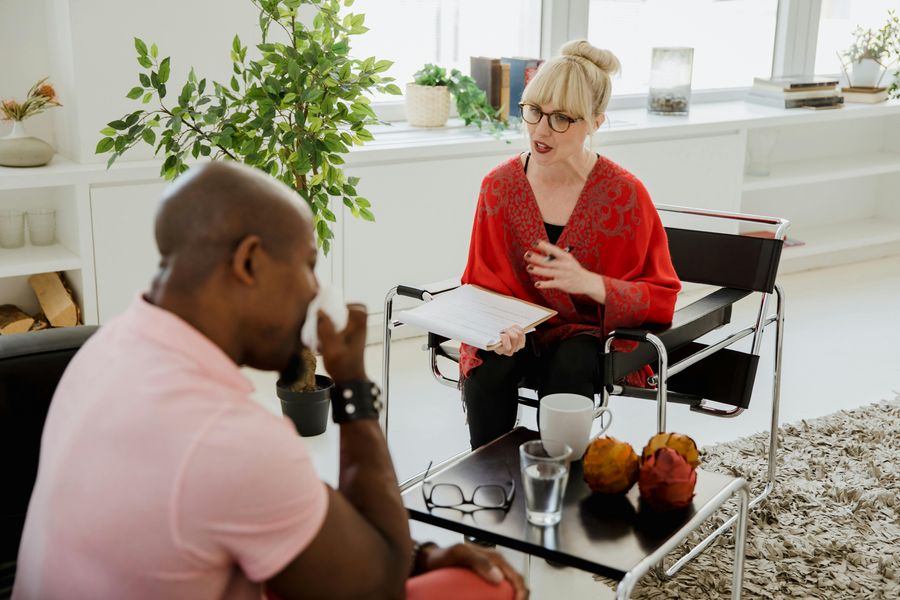Seeking Closure After a Breakup
Breakups can be tough. They can leave a lasting impact on our lives, whether positive or negative.
And sometimes, we just want closure. After all, when a relationship ends, we’re left with unanswered questions, a sense of loss, and the need to move on with our lives.
Which is why seeking closure after a breakup can be so important. What is Closure?
Closure can mean different things to different people. Partly because it’s a subjective experience, meaning it’s something that’s unique to us as individuals.
Essentially, closure is a process of resolving issues and finding a sense of peace and relief. In the context of a breakup, closure can mean reaching a point where you’re no longer hurt, angry, or confused about what went wrong.
When seeking closure during a breakup, you’re essentially trying to find the answers to questions like “What went wrong? “, “Why didn’t it work out? “, and “What could I have done differently?”. This can be important for a number of reasons.
The Importance of Closure
Closure after a breakup is important for several reasons. Firstly, it can help provide a sense of relief.
This is because closure can help to bring some finality to the situation. It can also help you to feel like there’s a resolution or an ending to the relationship, which can allow you to move on to the next steps.
Seeking closure can also give you a sense of redress. This means that by getting closure, you’ll be able to find some kind of recompense for what happened, either by getting answers or by reclaiming some kind of power over the situation.
It’s a way of gaining back some control and allowing you to move forward in a more positive way. However, closure doesn’t always mean the end of a relationship.
Sometimes, even after getting closure, you’ll realize that things could still work out and the relationship can be rekindled. Closure can help you identify the issues that were contributing to the relationship breakdown, which can allow you to work towards a better relationship in the future.
Ways to Heal and Move On Without Closure
It’s not always possible to get closure from an ex after a breakup. Some people may not be able to provide answers to your questions, and some may even have ghosted or disappeared altogether.
However, that doesn’t mean that you can’t heal and move on. Here are some ways to do that:
-
Let yourself feel what you feel – Initially, a breakup can be quite painful. It’s natural to feel hurt, angry, confused, or even weepy and needy.
Allow yourself to feel these emotions, but don’t let them control you. Try to acknowledge these feelings and work through them in a healthy way.
-
Take pride in your resilience – Breakups can make us feel like we’ve failed or like we’re not worthy of love.
However, it’s important to recognize the strength and resilience that you’ve shown to get through this situation.
-
Keep yourself busy – Staying busy can be a good way to distract yourself from negative thoughts or overwhelming emotions. Take up a new hobby, join a club, or plan a trip.
This will help you to focus on something else and create new happy memories.
-
Love yourself – This is key. Taking time to focus on yourself and your needs can help to rebuild your self-esteem and confidence.
Practice self-care by prioritizing sleep, food, and nurturing habits.
-
Avoid blame – Blaming yourself or your ex can be a slippery slope. This can lead to negative thoughts and emotions that can prolong the healing process.
Try to focus on fixing the situation instead of placing blame on yourself or your ex.
-
Redirect your thoughts – When a memory of your ex or the relationship pops up, acknowledge it but don’t dwell. Redirect your thoughts to something else.
This will help you break the cycle of negative thoughts and move towards a more positive outlook.
-
Build a recovery story – Pull from your experiences and grow from them. Build a story of your growth through this experience, where you stand today, and where you want to go.
Dealing with an Unexplained Breakup
Sometimes, a breakup can come as a complete shock. When you’re left with no explanation for why the relationship came to an abrupt end, it can leave you feeling uncertain, doubtful, and with a sense of unfinished business.
The Impact of Lack of Closure
An unexplained breakup can have a significant impact on your sense of self-worth and emotional well-being. You’re left with unanswered questions, doubts, unfinished business, and this can lead to feelings of confusion, despair, and disillusionment.
Reasons for Lack of Closure
Sometimes, the reason for a lack of closure is very complex. It could be due to a sudden end, communication issues, avoidance, or any one of the many reasons we might not get the answers or explanations we need.
This is partly because closure is a personal, subjective experience that’s unique for each of us.
Strategies for Moving On
- Dignity – As uncomfortable as it is, try to accept that you may never get your answers. Move forward with dignity, knowing that you’ve done your part to try and find closure.
- Acceptance – Accept that the breakup has happened and recognize your feelings around it. Acknowledge that you can’t change the past, and it’s time to move on.
- Self-care – Take care of yourself after a breakup. Rest, eat well, exercise, do things that you enjoy. Also, try to avoid rebound relationships, give yourself time to heal in your own way.
- Redirection – Redirect your attention and energy toward a new project or a new goal. This helps keep your focus on something positive, and the momentum will help carry you forward.
- Forgiveness – Forgiveness is a powerful force that can release any anger and tension you may be feeling. It’s not about condoning what happened but making peace with it.
- New beginnings – Create new and exciting opportunities and experiences. Do things that challenge you, make you happy, or allow you to explore your passions. Build a beautiful life that you love.
Conclusion
Remember that seeking closure after a breakup is a process. It takes time, patience, and effort.
While we may not always get the answers we seek, we can still heal and move forward in a positive way. Take care of yourself, love and trust yourself, and keep forging ahead.
You’ve got this.
Finding Ways to Move Forward
Life can sometimes throw us curveballs, and when we’re faced with a challenging situation, it’s easy to feel overwhelmed and powerless. But in order to progress and grow from these experiences, we have to find ways to move forward.
Self-Empowerment
One of the most effective ways to move forward is by empowering yourself. This means taking steps to foster your sense of self-worth, self-image, and self-assurance.
By valuing and prioritizing yourself, you are more likely to make decisions that align with your values and goals, which can give you a sense of control and purpose. Self-development is an essential aspect of self-empowerment.
By identifying areas where you can improve and making a conscious effort to grow, you’ll feel more capable and confident in your abilities. This can include things like learning new skills, taking courses, or gaining a deeper understanding of your strengths and weaknesses.
Mindfulness
Another way to move forward is by being more mindful.
Mindfulness is the practice of being present and aware of your thoughts, feelings, and actions with non-judgemental objectivity.
By focusing on what’s happening in the present moment, you can become more grounded and aware of your surroundings. This allows you to live more intentionally and make conscious decisions that align with your values and goals.
Mindfulness can also help you to develop a greater sense of gratitude for what you have in your life and the people around you. By appreciating the good things in your life, you’re more likely to feel positive and optimistic about the future.
Social Support
Building a support system is also essential for moving forward. This can include family, friends, colleagues, or even professionals like therapists or coaches.
Social support provides a sense of connection and belonging, and can help you to feel understood, validated, and supported. At times, moving forward can be difficult to achieve on your own.
However, with the right people in your corner, you can be assured that you’re not alone. Social support can also provide you with constructive feedback, advice, and resources that can help you to navigate difficult situations.
Accepting What You Cannot Control
While self-empowerment, mindfulness, and social support can help you to move forward, it’s also important to acknowledge and accept what you cannot control. This can be challenging, but it’s essential for letting go of the past and embracing the present.
Letting Go of Expectations
One of the things that can hold us back from moving forward is our expectations. Expecting closure, apology, resolution, or validation creates a certain level of attachment to the outcome, which can lead to disappointment, anger, or resentment.
To move forward, it’s important to let go of these expectations and be open to the possibility that things might not turn out how you want them to. Embracing the uncertainty of the future and allowing things to unfold can be liberating and empowering, and it opens up the possibility of discovering new opportunities or growth.
Embracing Uncertainty
Embracing uncertainty means that you’re open to taking risks, trying new things, and being comfortable with the outcome. It requires being adaptable and flexible, and trusting in your ability to cope with whatever comes your way.
By recognizing and embracing the inevitability of change, you’re more likely to capitalize on opportunities and discover new pathways for growth. Being open and receptive to change can lead to new possibilities and experiences that you never would have considered otherwise.
Building Resilience
Resilience is the ability to adapt, bounce back, and recover from adversity. It’s a quality that can help you to deal with uncertainty, change, and challenge.
Building resilience involves developing skills like courage, adaptability, optimism, and faith. By cultivating these qualities, you become better equipped to handle stress and navigate difficult situations.
By facing adversity head-on and learning from your experiences, you can develop an inner strength that can help you overcome obstacles and achieve your goals. In conclusion, moving forward can be challenging, but it’s essential for growth, development, and personal fulfillment.
Self-empowerment, mindfulness, social support, accepting what you cannot control, embracing uncertainty, and building resilience are all integral components of moving forward. By focusing on these areas, you can release yourself from the past and create a future that’s full of hope and possibility.
Moving On and Starting Over
Moving on is one of the most challenging things that we have to do in life. It requires us to let go of the past, embrace uncertainty, and create a new future filled with hope and opportunity.
Starting over can be exciting and daunting at the same time, but it’s an essential step in our personal growth and development. Here are some ways to achieve it:
Redefining Your Priorities
When starting over, the first step is to redefine your priorities. This means examining your goals, values, and purpose and determining whether they still align with your current situation and needs.
It involves taking stock of your life and deciding what’s important to you and what you want to achieve. To do this, consider what brings you joy, fulfillment, and meaning.
Ask yourself: What are my passions and why are they important to me? What am I good at, and how can I use these skills to create a meaningful future?
What legacy do I want to leave behind, and what steps do I need to take to achieve this? By clarifying your goals and priorities, you can create a roadmap for moving forward and finding purpose and meaning in your life.
Pursuing Your Passions
Once you’ve figured out your priorities, the next step is to pursue your passions. This means pursuing your hobbies, interests, talents, and skills that can add value to your life and create a sense of personal fulfillment.
Hobbies and interests can serve as a powerful outlet for creativity, self-expression, and relaxation. They can help you to break away from the routine and recharge your batteries.
They can also be a source of learning and personal growth, where you can develop new skills and meet like-minded people. Pursuing your passions can also lead to new opportunities and career paths.
By identifying the things that you’re passionate about, you can explore how these interests might translate into a fulfilling and successful career.
Opening Yourself to Love
One of the most difficult parts of starting over is opening yourself up to love. When we’ve been hurt or rejected in the past, it can be challenging to trust again and allow ourselves to be vulnerable.
However, opening up to love is an essential part of moving on. It involves taking a risk to connect with someone on a deeper level, to be intimate, and to trust them with your heart.
It means being open to the idea that there is someone out there who will love and accept you for who you are and being willing to take the chance to find that person. To open yourself up to love, it’s important to work on your self-esteem, self-worth, and self-image.
By understanding and accepting yourself, you’ll be better able to recognize others who share your values, interests, and priorities. Creating a strong social network can also help you to meet new people and build relationships.
However, it’s important to remember that finding love is not the end goal. It’s only a part of our journey towards personal growth and happiness.
Conclusion
Starting over is a journey that requires courage, resilience, and persistence. It involves redefining your priorities, pursuing your passions, and opening yourself up to love.
By taking these steps, you can create a future that is filled with purpose, joy, and fulfillment. Remember that moving on is not a linear journey; it’s one that will have its ups and downs.
But with time, patience, and effort, you can overcome the challenges and create a life that you love. In conclusion, moving forward after a challenging experience such as a breakup or life transition can be a difficult and emotional process.
However, by prioritizing self-empowerment, mindfulness, social support, accepting what you cannot control, embracing uncertainty, pursuing your passions, and opening yourself up to love, you can create a new sense of purpose and meaning in your life. It is important to remember that these steps are not a one-size-fits-all solution to every problem, but rather a guide towards creating a happier, more fulfilling life.
Ultimately, moving forward is a journey that requires courage, patience, and perseverance. By taking small steps each day towards intentional living, you can begin to create the life that you desire and deserve.



